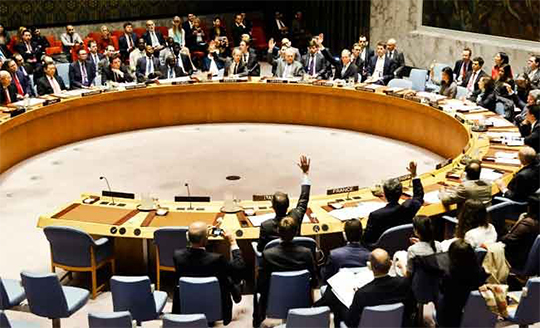New York, Apr 13: Russia vetoed Wednesday a UN draft resolution demanding the Syrian regime cooperate with an investigation of a deadly toxic gas attack on Syrian civilians last week which the West blames on the regime of Bashar Assad.

It was the eighth time that Russia has used its veto power at the UN Security Council (UNSC) to block action directed at its ally in Damascus.
The US told Russia at the UN that it is isolating itself by continuing to support the Syrian president, while Britain said its scientists found that sarin was used in a deadly toxic gas attack on Syrian civilians last week.
“To my colleagues from Russia, you are isolating yourselves from the international community every time one of Assad's planes drops another barrel bomb on civilians, and every time Assad tries to starve another community to death,” US Ambassador to the UN Nikki Haley told the UNSC.
During a heated UNSC meeting, Russia's Deputy UN Ambassador Vladimir Safronkov told the 15-member body that Western countries were wrong to blame Assad for the attack in the town of Khan Sheikhun. “I'm amazed that this was the conclusion. No one has yet visited the site of the crime. How do you know that?” he said.
Britain's UN Ambassador Matthew Rycroft told the UNSC that samples taken from the site of the gas attack, in an opposition-held area of northern Syria, have tested positive for the nerve gas sarin. He accused Russia of siding with “a murderous, barbaric criminal, rather than with their international peers.”
Haley accused Iran of being “Assad's chief accomplice in the regime's horrific acts,” adding: “Iran is dumping fuel on the flames of this war in Syria so it can expand its own reach.”
UN Syria mediator Staffan de Mistura warned the UNSC on Wednesday that fragile progress in peace talks was now “in grave danger.”
Meanwhile, US Secretary of State Rex Tillerson battled to overcome differences with his Russian counterpart on Wednesday. They remained split over the chemical attack in Syria after talks in Moscow.
“Despite the quantity of existing problems... there are considerable prospects for joint work,” Russian Foreign Minister Sergei Lavrov told a news conference after talks with Tillerson and Russian President Vladimir Putin.
“Russia is open to this, open to dialogue with the US in all different areas, not only to dialogue but to joint action aimed at results in the areas where this corresponds to the interests of both countries,” said Lavrov.
Tillerson, who met with Putin earlier on Wednesday, deplored the “low level of trust” between the countries, whose relations have dropped to a post-Cold War low over Ukraine and Syria. “The world's two foremost nuclear powers cannot have this kind of relationship,” Tillerson said.
He said working groups would be established to improve US-Russian ties and identify problems, adding that the two sides would discuss disagreements on Syria and how to end its six-year civil war.
Tillerson said Syria's regime had committed more than 50 attacks using chlorine or other chemical weapons during the conflict. He suggested that possible war crimes charges could be levied against Assad.
Russia has never publicly acknowledged any such attack by Assad's forces, and has tried for the past 18 months to help him expand his authority in Syria.
Lavrov said Moscow was ready to resume a deal with Washington to avoid incidents in Syrian airspace as the two countries lead separate bombing campaigns.
“Today the president confirmed our readiness to return to its implementation on the understanding that the original aims of the air forces of the American coalition are reaffirmed, namely the fight with IS (Daesh) and Al-Nusra,” Lavrov said.
The deal was suspended after US strikes against a Syrian air base following last week's gas attack in Idlib province, in an act Moscow labeled “aggression against a sovereign state.” The two sides agreed to work together on an international investigation of the gas attack.






Comments
Add new comment